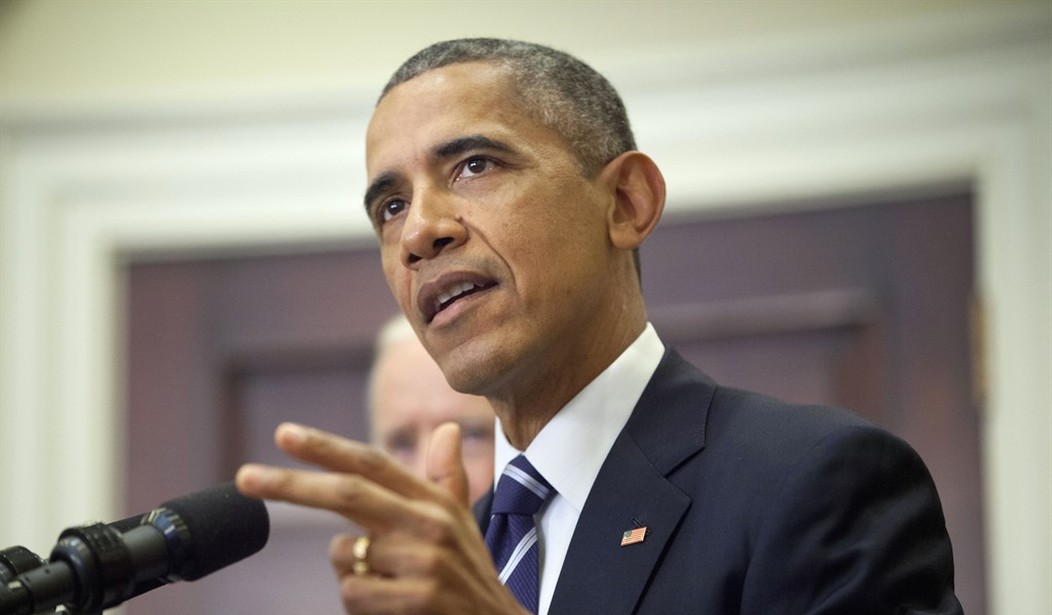The United States is now back in Iraq; we’re sending a scant number of Special Forces into Syria; and Secretary of Defense Ashton Carter said last month that U.S. troops would see “more direct action on the ground” in both arenas. Russia seems to be taking point in wiping out ISIS (and possibly non-ISIS) targets, and our $500 million program to train Syrian rebels was scrapped due to its abject failure. Overall, none of what the U.S. has done has curbed the Islamic State’s influence or expansion, which is probably why 60 percent of the country disapproves of how the president is handling the situation (via AP):
Americans are souring on President Barack Obama's approach to fighting the Islamic State, according to an Associated Press-GfK poll that also found deep pessimism about U.S. prospects for success in Afghanistan and uncertainty about Obama's plan to leave thousands of troops there when he leaves office.More than 6 in 10 now reject Obama's handling of the threat posed by the Islamic State in Iraq and Syria, where Obama has been escalating the U.S. military's involvement in a bid to break a vexing stalemate. Support for his approach has followed a downward trajectory since the U.S. formed its coalition to fight the group in late 2014. Last September, Americans were roughly split, yet disapproval has jumped 8 percentage points just since January.
Those concerns mirror broader trepidation about Obama's management of foreign policy, which garnered approval from just 40 percent of Americans in the AP-GfK poll. They come as Obama struggles to demonstrate progress advancing U.S. interests in the Middle East, where Obama hoped to disentangle the U.S. military after a decade-plus of war but will likely leave three military conflicts ongoing when his presidency ends in 2017.
The president is also under fire from his own side of the aisle. Virginia Democratic Sen. Tim Kaine said that the president sill has no strategy for fighting ISIS in Syria, even after the first airstrikes were carried out 16 months ago. Kaine, who sits on the Senate Foreign Relations Committee, also said that any military action against ISIS should be met with a congressional vote (via Yahoo! News):
Recommended
“They’ve got to put a credible Syria strategy on the table,” Kaine said. “They’ve got to put a strategy on the table that deals with the ISIL third of the problem, with the Assad third of the problem, and with the massive humanitarian disaster third of the problem. And they’re just not doing that.”Kaine said the administration’s approach to taking on the Islamic State in Iraq was relatively clear, but “in Syria, it’s just not really a strategy.”
[…]
Kaine lamented that the Obama who ran for president in 2007 vowing to rein in American military intervention has given way to a commander in chief who has embraced a potentially dangerous view of executive war-making power. The senator worried that this assertiveness and congressional unwillingness to challenge the White House would leave a terrible legacy to the next president.
“I’m a strong supporter of the president. I think ISIL is evil. I think the United States should be undertaking military action against ISIL. But not without a vote of Congress,” he said. “Because if we allow this president, or any president, to wage a war for 16 months without needing the permission of Congress, we’re setting a horrible precedent.”
Also, while the United States figures how to deal with ISIS, we still have Iran to worry about, especially during this period where they say they won’t develop nuclear weapons. Right now, for the first time in nearly ten years, the U.S. doesn’t have an aircraft carrier in the Persian Gulf (via the Hill):
The Navy’s 272-ship force is straining under today’s security challenges, some experts say — and one glaring symptom is a shortage of aircraft carriers.For the first time in almost a decade, the Navy does not currently have a single aircraft carrier in the Persian Gulf area to execute the war against the Islamic State in Iraq and Syria (ISIS), or to keep Iran in check.
There was also an interruption to what is billed as a “continuous carrier presence” in the Asia-Pacific region after the USS George Washington left in July and its replacement did not get there until the fall.
Earlier this week, senior Navy officials publicly acknowledged there will be more gaps next year. The basic problem is simple: The Navy only has 10 aircraft carriers, one short of what senior officers say is required.
"We require 11 aircraft carriers to meet our full range of military operational requirements,” the Navy’s Assistant Secretary for Research, Development and Acquisition, Sean Stackley, told the House Armed Services Seapower and Projection Forces Subcommittee on Wednesday.
"Today we're at 10 — and we're at 10 that are highly stressed because they have been driven hard," Stackley said.
An 11th aircraft carrier, the USS Gerald R. Ford, is slated to be commissioned in 2016, but won't be ready to deploy until 2021.
The publication added that the U.S. Navy’s goal is to have 303 ships operational by 2021. Nevertheless, the current strategic situation the country finds itself as we combat global terror should give both the national security hawks and the somewhat dovish wings of both parties something to debate. We see what happens when America isn’t taken seriously after our various red lines we set are either crossed or re-written into something shamelessly transparent in order to prevent a military response. At the same time, without a strategy, and apparently the resources to fully defend the country’s interests, what should we prioritized for the long term and what should be considered for de-escalation.

























Join the conversation as a VIP Member